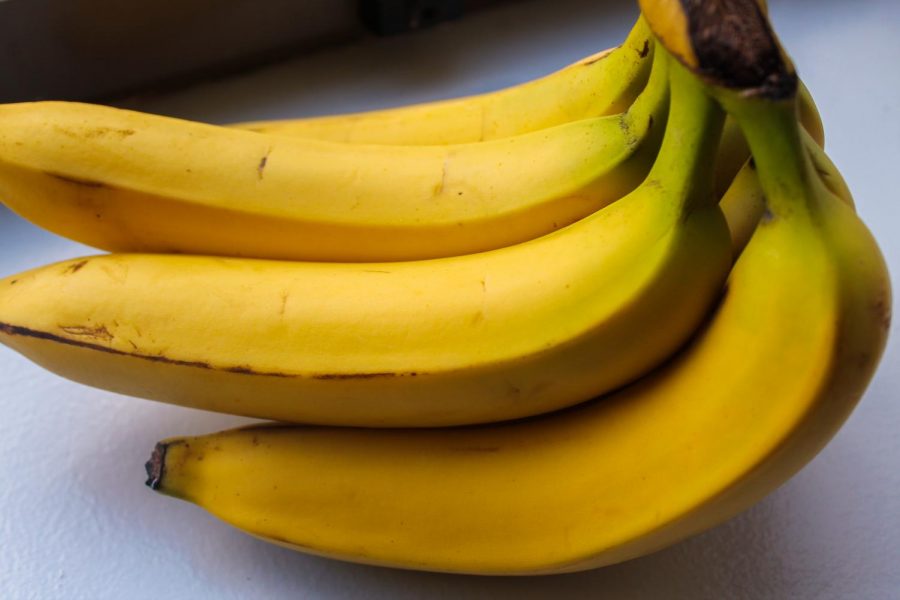The Ins and Outs of Digestion
ISABELLE DALBY/THE OBSERVER
Bananas are one of a few foods that contain probiotics, which are good bacteria that exist in the stomach.
January 28, 2020
It is well known that one of the primary factors in maintaining a healthy lifestyle is a balanced and nutritionally rich diet. What happens after those healthy foods enter the body is often overlooked.
Digestive health is not always something busy students have time to think about when scrounging for food between classes, internships and other various commitments.
Proper digestion can be beneficial to more than just avoiding the occasional — or more than occasional — stomach ache and there is a lot more to it than just the food involved in the process.
The first thing to keep in mind when it comes to digestion is that what is considered normal is different for everyone.
“A lot of times people are walking around thinking their digestion is normal, and normal for them might be like, ‘Oh, I have a stomach ache after every meal and that’s what everyone feels,’ and they don’t realize that that’s maybe not as healthy as they could be, but because they’ve lived their whole life like that it’s their normal,” said Melanie Simeone, Fordham Campus Dining’s resident dietician.
Although food is not the only element with an effect on digestion, it is one of the most important and controllable factors in regulating it. A diet rich in plant-based foods is beneficial for many reasons, one of the most basic being that this is where fiber comes from.
Fiber, the nondigestible part of a carbohydrate, is typically found in fruits, vegetables and whole grains. It is important to the digestive system because it promotes bowel regularity and helps the digestive tract push food from the stomach through the intestines in a process called peristalsis.
“In terms of fiber requirements, women really need to be eating 25 grams of fiber and men should be eating 38 grams,” Simeone said. “And a lot of times Americans in a very Western diet might only be getting like 9, 10 grams of fiber a day which is, you know, very small in terms of what we really should be consuming.”
Other important elements to digestion on the consumption side are probiotics and prebiotics. While the two terms can be easily confused, knowing the difference between them is important to be able to properly work with them. Probiotics are the good bacteria that already exist in the stomach; prebiotics are promoters of the good bacteria.
“In order for the probiotics to remain and be in good quantity, you need to consume prebiotics,” Simeone said.
Prebiotics are found in many foods that are high in fiber like whole grains, and according to Simeone, also in foods like bananas, onions, garlic, leeks, asparagus and artichokes.
The number of probiotics that exist in the stomach is different from person to person, but everybody has them. Similar to prebiotics, there are also foods rich in probiotics that can be consumed to promote healthy gut balance. These include fermented dairy foods like yogurt, kefir and aged cheeses as well as kimchi, sauerkraut, miso and tempeh.
Other than making the right choices when it comes to food, there are three other main practices that can help to promote good digestion, the first being exercise.
“Exercise helps keep your bowels regular, especially 10 to 15 minutes of physical activity after a meal,” Simeone said.
For students, this can even include the walk back to the dorm or classes from the dining hall. This small amount of movement can aid in improving gut transit time, which is the amount of time it takes for food, once it has been consumed, to exit the body.
Hydration is another important component of good digestion that is easy to overlook. Staying hydrated can help to move food through the digestive system. Dehydration is also one of the main causes of constipation.
According to Mayoclinic, the daily recommended fluid intake for men is about 15.5 cups or 3.7 liters and about 11.5 cups or 2.7 liters for women. These recommendations include intake from water and other beverages as well as from food.
Eight glasses of water a day is a commonly recommended goal and is reasonable for most people. Just as digestion itself is a unique process for everybody, the amount of water an individual needs to stay hydrated also varies.
What is considered regular when it comes to bowel movements can also differ quite a bit.
“I would say if someone wants to assess whether they’re regular or not, it would be if it’s always one (bowel movement) a day, are you having one a day, or are you going like three days without a bowel movement?” Simeone said. “That would be an indicator that you are having some constipation issues.”
The third and likely the most overlooked component that can have an effect on digestion for students is stress.
“Stress hormones can negatively affect digestion by taking away blood and energy from the digestive system,” Simeone said. “Stress can lead to leaky gut, which is a condition in which the cells that line our gut become more permeable, which allows undesirable things to seep from the gut.”
When it comes to improving digestion, thinking about what can be added to a regular routine or diet can be more beneficial than focusing strictly on what to cut out. For example, the fiber content of an omelet can be increased simply by throwing in some vegetables.
Smoothies are also a great way to get a high serving of fiber through fruits and vegetables. Unlike juices, smoothies retain the fiber content of the whole fruits and vegetables used. Simeone suggested even adding high-fiber foods like cauliflower or avocado to a smoothie, which, similar to bananas, can make a smoothie very creamy.
When it comes to increasing intake of fiber and prebiotics and probiotics, the best way to go about doing so is by consuming foods rich in each substance. While supplements are available, they tend to be costly and are often unregulated.
“Food is always, you know, most cost-effective and you’re going to have the same benefit there,” Simeone said.
Practicing mindful eating — meaning turning off Netflix or finding time to sit down during a meal — can be beneficial to digestion. Students never hear the end of the discussion on time management, but it is just as important when it comes to finding time to cook a healthy meal or fit in a short walk to aid digestion.
Signs of digestive disruption like stomach pain or constipation do not always need to be a cause for concern. Assessing diet, exercise, hydration and stress levels and implementing small changes can often be enough to see improvement.











